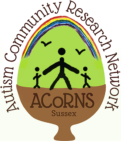Monthly Autism Reading Group (May 2022) – Autism and Gender Identity
Our autism reading group this month focused on the topic of gender diversity and autism. The current literature suggests that people who don’t identify with the gender assigned at birth are 3-6 times more likely to be autistic. Our discussion was really interesting and focused around 4 main areas: How can education surrounding gender identity […]
Monthly Autism Reading Group (May 2022) – Autism and Gender Identity Read More »
